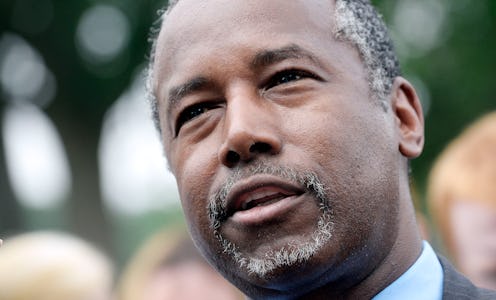News
What Is Ben Carson's Stance On Race Relations?
Following his performance in the first GOP debate, Ben Carson was considered the winner of the main event, as he gained 5 points in post-debate polls, according to Fox News. As the only black candidate in the field of 2016 Republican presidential hopefuls, the former neurosurgeon could woo the black vote to the Republican Party, a demographic that proved critical in electing President Obama both in 2008 and 2012. Even as incidents of possible police brutality continue to dominate headlines, Carson has made his stance on race relations known: He thinks they were better before Obama took office, and Carson's made it clear he's looking for a return to what he sees as fundamentals to turn things around, not a reliance on social programs.
Back in November, before he decided to run for president, during a discussion about the shooting of teenager Michael Brown in Ferguson, Missouri, Carson said on Hugh Hewitt's radio show that Obama put an "unusual emphasis on race." He said he disagreed with the president's take that racism continues to be a serious problem in America in 2015. "There will always be some [racism], because there's always going to be people with small minds who are easily influenced," Carson said. "But you know, for the most part, you know, that’s a thing largely of yesterday."
Since the campaign season began, Carson's take on race relations has been varied, and his reaction to recent events has been inconsistent. Last Wednesday, Carson said Black Lives Matter activists were "creating strife," The Guardian reported, and he said African Americans should return to the principles of "family and faith" which are what "got black people through slavery and segregation and Jim Crowism." Carson made the remarks after an event in Harlem, and mentioned the oft-repeated statistic that homicide is the most likely cause of death for black men (it is only the leading cause of death for certain age groups, ages 15-24 and 25-34).
Of course black lives matter. But what I feel instead of people pointing fingers at each other and just creating strife, what we need to be talking about is how do we solve problems in the black community.
Carson was asked at that event whether he thinks the GOP has a race problem, to which he replied, "Everyone has a race problem." It's interesting to note that the Harlem event, which was not open to the public, was held at Sylvia's Restaurant, a staple of the neighborhood, which has photos of Obama and former President Bill Clinton on its walls, The New York Times reported.
But then there are times when he's the only voice in the GOP side of the race speaking up about racial tensions. For instance, Carson criticized fellow Republicans in a USA Today op-ed after the Charleston church shootings, which left nine black people dead. Some candidates, Carson wrote, were afraid to call the shootings a hate crime in fear of alienating voters:
Not everything is about race in this country. But when it is about race, then it just is. So when a guy who has been depicted wearing a jacket featuring an apartheid-era Rhodesian flag allegedly walks into a historic black church and guns down nine African-American worshipers at a Bible study meeting, common sense leads one to believe his motivations are based in racism.
In a Gallup poll conducted before the debate, Carson was the only Republican candidate with a favorable rating among black voters. Worth noting that his net favorable rating of 4 percent was dwarfed by Hillary Clinton's 68 percent. But he struggles with name recognition among black voters, the poll found, with Donald Trump leading in that category. Trump's overall favorability was the lowest of the declared GOP candidates, however, at a minus 48.
As The Root pointed out, black voters' participation in Republican politics has been almost zero for decades. So Carson may not expend too much energy trying to court black voters, instead appealing to the party's base. His criticism of Obama (once during a speech when the president was sitting in the audience listening) seems to show that it is indeed GOP voters, rather than black voters, who Carson is attempting to court. His campaign hasn't showed signs of straying from that path yet, closely hewing to his stump speech during an appearance at the Iowa State Fair.
Despite the amount of negative publicity and the outcry from the community in Ferguson afterward, Michael Brown's death, unfortunately, did not act as a deterrent to acts of alleged police violence against black people. It's difficult to get context for how the current state of affairs compares to the past, since data on how many Americans are killed by police each year is hard to come by. But according to data compiled by a research collaborative of activists called Mapping Police Violence, nearly 200 black people have been involved in fatal incidents with police officers in 2015 alone.
For Carson to stick to his "racism is a thing of the past" view seems to contradict what's going on in the present. Whether Carson can regain what the Post called his "hero" status among black voters is still very much to be determined.
